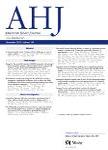版权所有:内蒙古大学图书馆 技术提供:维普资讯• 智图
内蒙古自治区呼和浩特市赛罕区大学西街235号 邮编: 010021

作者机构:Cleveland Clin Fdn Dept Cardiol Cleveland OH 44195 USA Univ Minnesota Sch Med Vasc Med Program Minneapolis MN 55455 USA Heidelberg Univ Sch Med Dept Neurol Heidelberg Germany
出 版 物:《AMERICAN HEART JOURNAL》 (美国心脏杂志)
年 卷 期:2000年第140卷第1期
页 面:67-73页
核心收录:
学科分类:1002[医学-临床医学] 100201[医学-内科学(含:心血管病、血液病、呼吸系病、消化系病、内分泌与代谢病、肾病、风湿病、传染病)] 10[医学]
主 题:阿司匹林/投药和剂量 脑缺血/药物疗法 脑缺血/病因学 脑缺血/死亡率 死亡原因 置信区间 双盲法 出血/药物疗法 出血/死亡率 住院/统计学和数值数据 发病率 缺血/药物疗法 缺血/病因学 缺血/死亡率 多元分析 心肌梗死/并发症 心肌梗死/药物疗法 心肌梗死/死亡率 外周血管疾病/并发症 外周血管疾病/药物疗法 外周血管疾病/死亡率 血小板聚集抑制剂/投药和剂量 概率 预后 比例危险度模型 复发/预防和控制 危险性评估 存活率分析 噻氯匹定/投药和剂量 噻氯匹定/类似物和衍生物 女(雌)性 人类 男(雄)性 中年人
摘 要:Background Repeat hospitalizations of patients with atherosclerosis represent a considerable burden on the health care system. We sought to determine whether clopidogrel compared with aspirin decreases the need for rehospitalization for ischemia and bleeding. Methods and Results The Clopidogrel Versus Aspirin in Patients at Risk of Ischemic Events (CAPRIE) trial was a randomized, blinded, multicenter, trial of 19,185 patients with atherosclerotic disease manifested as recent ischemic stroke or myocardial infarction or symptomatic peripheral arterial disease. Without any double-counting of events, the number of rehospitalizations for ischemic events (defined as angina, transient ischemic attack, or limb ischemia) or bleeding events was determined for the entire cohort. There was a significant reduction in the total number of rehospitalizations for ischemic events or bleeding with clopidogrel use compared with aspirin (1502 vs 1673;P = .010) over an average of 1.6 years of treatment. This reduction in rehospitalization was consistent across individual outcomes of angina, transient ischemic attack, limb ischemia, and bleeding. Compared with aspirin, clopidogrel also resulted in a 7.9% relative risk reduction in a combined end point of vascular death, stroke, myocardial infarction, or rehospitalization for ischemic events or bleeding (15.1% to 13.7% at 1 year;P = .011). Adjusting for baseline prognostic variables, clopidogrel therapy was an independent predictor for reduction of vascular death, stroke, myocardial infarction, or rehospitalization for ischemic events or bleeding (P = .009). Conclusions Treatment with clopidogrel results in a significant decrease in the need for rehospitalization for ischemic events or bleeding compared with aspirin. This meaningful end point tracks well with other, more traditional measures of outcome and has incremental value beyond such end points.